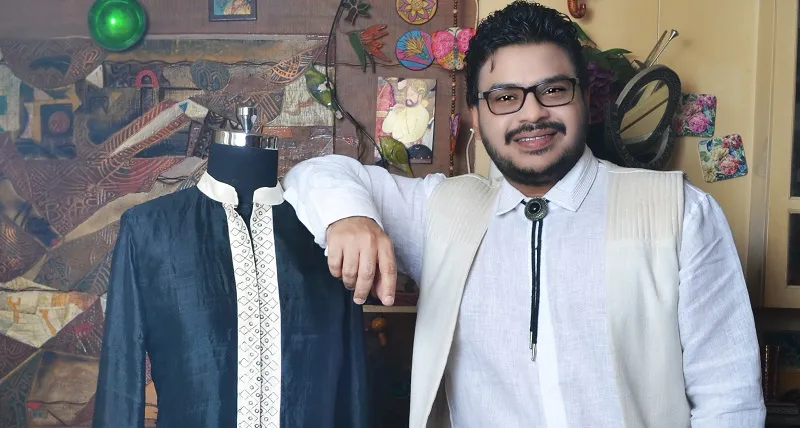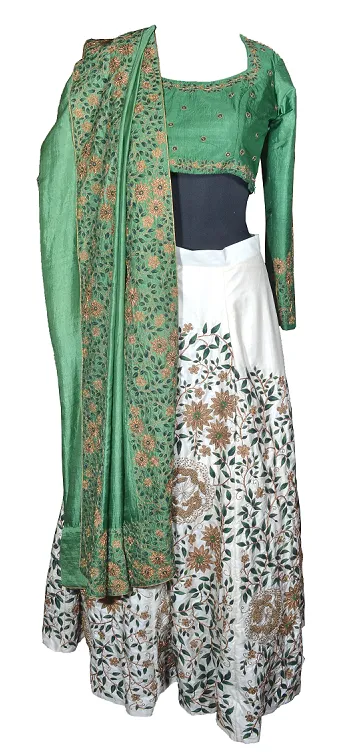“We must replenish rather than deplete Mother Earth” – Ahmedabad-based Bhu:sattva's silent organic clothing revolution
The 2016-17 Union Budget has placed much emphasis on organic farming, with an allocation of Rs 412 crore and a pledge to bring 5 lakh acres under organic farming in the next three years. Yes, Indians are embracing the move as more and more people are switching to organic foods given the health and environmental benefits associated with it. It is estimated that the organic food market itself would touch the $1.36 billion mark by 2020; it is currently growing at 25-30 per cent. However, we are lagging behind in terms of embracing organic clothing with the same comfort, given the increased costs and lack of easy availability. But, Ahmedabad-based Bhu:sattva is undeterred by the slow growth, and has been silently sparking an organic revolution since 2009.
Meet the Ecopreneur

Jainam Kumarpal has loved fashion for as long as he can remember. After completing his post-graduation in entrepreneurship, he decided to join his family business Rising Tradelink and started Bhu:sattva in 2009, after considerable research speaking to farmers’ collectives, artisans and weavers. He says,
Back then, even though there were a few organic players, there was still a gap – they continued to use artificial dyes. So, the end product wasn’t completely organic and was doing nothing to strengthen a sustainable fashion movement for the future.
He adds,
We come from the earth and must give back to it, replenish rather than deplete it. So, we decided to ‘start green’ instead of ‘going green’. Our research showed a promising future for organic clothing and it hasn’t failed us.
Stressing the need to organic, Jainam says,
Everything we do has an impact on the earth. In terms of clothing, synthetic fabrics are energy-intensive processes requiring huge amounts of pesticides, fertilisers and irrigation. Organic, on the other hand, is the complete opposite; the process of harvesting natural fibres is minimal. Going green isn’t a symbol of class anymore, rather it signifies the essence of survival.
Bhu:sattva – An organic revolution bringing together farmers, artisans and people

Bhu:sattva has established linkages with over 1, 500 certified organic farmers and weavers across the country. They source their raw materials from states such as Andhra Pradesh, Tamil Nadu, Assam, and Sikkim. The company works with organic cotton, jute, khadi, and cruelty-free silk, like any other organic brand. It has also ventured in to hemp, often touted as the ‘greenest textile’ and bamboo fabric, known for its’ anti-bacterial and most sustainable properties.’
But what really sets Bhu:sattva apart is the introduction of fruit and plant-based fibers in to its textiles – pineapple, flax, milk-protein, banana, and aloe vera to name a few. Jainam says, “These are value-adds, which help us deliver high-end textiles having a positive impact on the customer’s mind and body.”
For instance, the banana fibre is extracted from the stem sheaths of banana, which is highly cellulosic and soft. It has an average fineness of 2400 nm making it easy to spin through any means, and is mainly added to summer garments for its increased bio-degradable nature and softness. Another example is that of the milk protein fibre, which is extracted from casein. When blended with other natural fibers, it adds durability and shine and is extremely useful for garments which need to have a flowy drape. The aloe vera fibre remains a favourite in Bhu:sattva as microscopic and airtight aloe vera capsules are infused into the fabric, which releases aloe vera every time the fabric is touched or rubbed. So, essentially, every time the infused garment is worn, aloe automatically gets applied to the skin.
Finally, the garment is coloured from extracts of natural colouring agents such as beetroot, pomegranate, turmeric, catechu, teak tree leaves and indigo. The last process is “empowering the local artisans” who are allowed to display the magic of their hands and creativity on the fabric. They indulge in a wide variety of hand-paintings, hand-embroidery and block-printing to lend a touch of Indian ethnicity and complete the piece, organically.
Impact and way forward
The company is also involved in a wide range of social projects such as ‘Mission Mangalam’, which was started by the Gujarat Government to elevate women living below the poverty line by training them and giving work opportunities. Bhu:sattva was the only company that signed up for the programme and trained over 700 women in different processes of the production of organic garments such as herbal dyeing, block printing, cutting, and stitching. Its aim is to empower 10, 000 rural women in the near future.
As for the overall fashion industry, Bhu:sattva has added many firsts. It started with men’s apparel and slowly ventured in to women’s apparel as well. Recently, the company launched its collection of organic bridal wear – a first in the industry again. In the near future, the company plans to introduce organic footwear, thus, allowing its niche clientele to go green from head to toe! Between 2012 and 2015, Bhu:sattva’s business volumes have grown by almost 40 per cent, giving meaningful and sustained employment to over 1, 500 people. The company has a presence in 35 cities in India and delivers to 15 countries, worldwide.
Global clothing chains have also introduced elements of organic into their lines- H&M has vowed to source all its cotton from sustainable sources by 2020 and so has Adidas. Levi Strauss on the other hand, is reducing its footprint by partially using recycled fibres. Closer home, designer houses such as Anokhi and Anavila have already embarked on the organic route and there are many companies that have introduced themselves such as Indiegreen, No Nasties, Do You Speak Green and Ethicus. As Jainam says,
The organic clothing sector will grow manifold given the increased ecological awareness and knowledge about its benefits now.
Read More:
Four fashion brands that are blending environment and livelihoods
Mi Dulce An’ya lines up organic cotton clothing for the newborns
Aura Herbal is turning organic clothing into a conscious fashion choice







